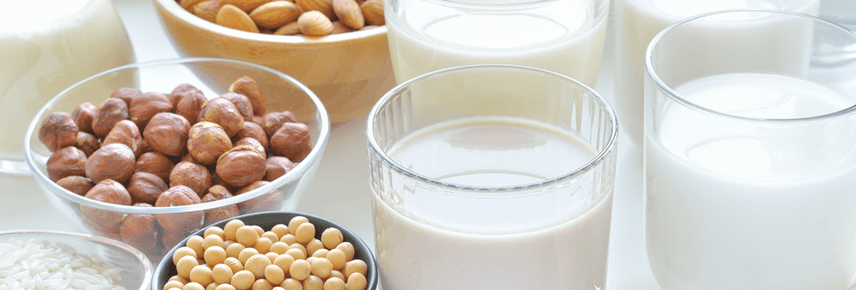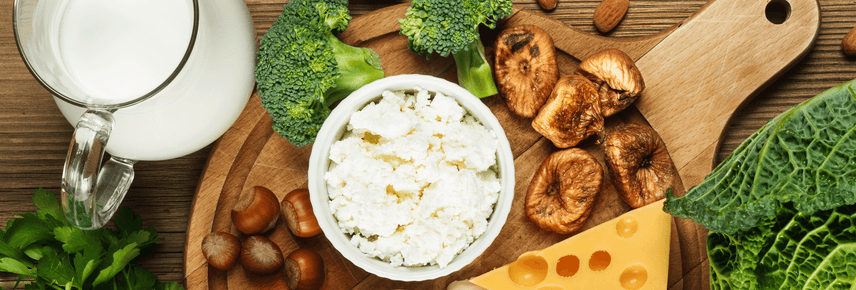
Food in focus: Almond milk
Answering the request to “grab some milk on your way home”, isn’t quite as easy as it used to be. Consumer research shows the average Aussie household now has around three types of milk in the fridge at any point in time!
While plant-based milks aren’t new - in fact, Sanitarium introduced Australians to soy milk in 1986 - the volume at which these milk alternatives are being splashed in smoothies, frothed in morning flat whites or poured on cereal is staggering. Soy milk may have been the original, but these days there's a plethora of plant varieties to choose from, and while oat milk is currently the talk-of-the-town, almond milk remains Australia's favourite dairy alternative.
Here are the most asked questions about this popular nutty beverage and their answers.
What is almond milk?
Almond milk is made from blending almonds (usually softened and churned into a paste) with water. Of course you can't 'milk' an almond, but the result is a delicious lactose-free, dairy-free liquid with a subtle nutty flavour profile that can be used in the same way as dairy milk.
Most people love almond milk for its taste and light texture which makes it a particularly great partner for cereals and smoothies. It's also a great choice for people who are trying to minimise their energy and saturated fat intake, are lactose intolerant (lactose is the naturally-occuring sugar found in dairy milk), experience digestive discomfort from dairy or have a dairy allergy or sensitivity.
Also driving demand for almond milk is the growing worldwide trend of people seeking to reduce their consumption of animal-derived foods, drinks and other products. Whether you're a flexitarian (mostly plants), vegetarian (all plants, no meat, but dairy and eggs might be ok) or vegan (100% plant-powered, no exceptions), almond milk is an easy swap.
Is almond milk good for you?
Yes! Almond milk is lower in kilojoules and saturated fat than dairy, and naturally cholesterol free. Almond milks naturally contain vitamin E from the almonds. As part of a balanced diet, Vitamin E is an antioxidant that protects the body’s cells. You can also find almond milks that are fortified with additional nutrients such as calcium, B2 and B12 vitamins, protein, phosphorus and potassium.
So Good Almond Milk uses Australian almonds and is fortified with vitamins B12 and B2, and calcium, which is essential for healthy bones, as part of a balanced diet.
Does almond milk contain protein?
Almond milk contains a small amount of naturally occurring protein (1-2g per glass); however, you can find some almond milks that are fortified with plant protein, such as So Good High Protein Almond Milk which has 10.2g of plant protein per 250ml serve.
Almond milk is a tasty base for delicious smoothies with added protein power. - whether that be in the form of plant-based sources or powders. If you are looking for a higher protein plant-based milk, soy milk is a great choice.
Does almond milk contain calcium?
Australian and New Zealand food laws allow nut-based milks to be fortified with calcium, the mineral needed for healthy bones and teeth.
So how do you know if your nut milk contains a good amount of calcium? Simply check the Nutrition Information Panel on the pack and look for a nut milk that provides a minimum of 100mg of calcium per 100mL.
Is almond milk suitable for free-from diets and people with allergies?
You can enjoy almond milk as part of wide variety of diets including lactose free, dairy free, gluten free, vegan, and low FODMAP diets (The Monash FODMAP app is available to download, and contains a listing of foods, including almond milks that have been tested and whether they are low FODMAP).
How do you choose the best almond milk?
Look for an unsweetened almond milk that is fortified with calcium (a minimum of 100mg of calcium per 100mL) as well as vitamin B2 and vitamin B12.
Can babies and children have almond milk?
While fortified almond milk is a nutrtitious plant-based alternative to regular cow’s milk, it doesn’t contain as much protein as other plant-based milks, such as soy.
For this reason, nutrition experts do not recommend almond milk as a complete replacement for dairy milk, for children under five. Toddlers need both protein and fats to help keep up with the demands of their rapid growth and development.
That doesn’t mean almond milk can’t be part of your child’s diet. If you are looking to include almond milk in your child’s diet, look for an unsweetened, plain almond milk that has been fortified with calcium and B vitamins, like B2 and B12.
If your child has lactose intolerance or a milk protein allergy, your GP or dietitian will be able to help you work on an eating plan that ensures they can enjoy dairy-alternatives and still get the protein and other nutrients they need.
What are the best uses for almond milk?
Almond milk comes in a wide range of varieties each with their perfect use. Choose barista varieties for hot drinks such as lattes or hot chocolates. Low kilojoule, unsweetened almond milks are a great base for protein shakes or morning smoothies, while regular almonds milks add a delicious nutty flavour to your morning cereal or cooking. Here’s some almond milk recipes to try.
Got questions about soy milk or oat milk?
We've got your answers on soy milk here and oat milk here.
Our dietitians are available to answer your questions too, you can contact them here.
Got more questions about vegetarian eating or plant-based diets?
Our Guide to Vegetarian Eating hub includes everything you need to improve your health and wellbeing through taking a more plant-based approach to your diet. Download a free e-book to get started or try some of our fan-favourite recipes here.

The latest nutrition advice, plus health and wellness tips delivered to your inbox monthly

